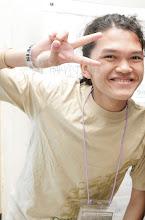I have difficulties in english, one of them is how to say english word well (pronouncing).
But I do remembered the Melanesian English. I remembered how they speak English with repeated words "long" and "blong". Then I surf on the www, I found an article about their English.
It was reminding me about my past question, why do the people in south Africa need to use translator to translate if someone speak in English (as I saw one example: an Englishman preaching in church).
Kan, they all know English, they speak English.. truz, why then?
i think, it will help me if we speak english like them..it's more easy to do..hehe
This is the article from http://www.andrewgray.com/ :
Simplify your vocabulary.
The vocabulary of Bislama is largerly based upon that of English, but manages with a much smaller number of words. In many situations, Bislama has just a single word where in English we have more than one. For example, instead of the words "rock" and "stone" there is just a single word ston.
The following words can be used in Bislama more-or-less the same as in English:
afternoon (aftenun), airport (epot), banana (banana), ball (bol), bank (bang), basket (basket), battery (batri), bean (bin), bed (bed), beer (bia), bicycle (baskel), blanket (blangket), body (bodi), bottle (botel), box (bokis), boy (boe), bread (bred), bus (bas), business (bisnis), butter (bata), canoe (kenu), chief (jif), chocolate (joklet), church (jioj), coconut (kokonas), coffee (kofi), colour (kala), company (kampani), corner (kona), country (kantri), cup (kap), day (dei), doctor (dokta), dog (dog), door (doa), egg (eg), eye (ae), face (fes), field (fil), finger (fingga), fire (faea), fish (fis), flower (flaoa), friend (fren), fruit (frut), garden (garen), girl (gel), glass (glas), ground (graon), hair (hea), half (haf), head (hed), hill (hil), hole (hol), horse (hos), hospital (haospetal), house (haos), ice (aes), island (aelan), juice (jus), kitchen (kijin), knife (naef), law (loa), leg (leg), life (laef), light (laet), machine (masin), man (man), market (maket), medecine (meresin), middle (medel), milk (melek), money (mani), moon (mun), morning (moning), mouth (maot), news (nius), night (naet), nose (nus), number (namba), nurse (nes), nut (nat), office (ofis), paper (pepa), pastor (pasta), piece (pis), pig (pig), place (ples), plane (plen), plate (plet), police (polis), price (praes), rain (ren), rice (raes), river (reva), room (rum), salt (sol), school (skul), ship (sip), skin (skin), smell (smel), soap (sop), star (sta), stone (ston), student (studen), sugar (suga), sun (san), table (tebol), tax (takis), tea (ti), telephone (telefon), thunder (tanda), time (taem), tin (tin), town (taon), village (velej), water (wota), week (wik), wharf (wof), woman (woman), wood (wud), world (wol), year (yia)
There are some other Bislama terms that are not normally used in English but will be familiar to English speakers. Expatriates who have been in Vanuatu for a long time often get into the habit of using these words even when speaking normal English. Examples include:
bensin ("benzine") - petrol/gasoline
faol ("fowl") - chicken
puskat ("pussy cat") - cat
samting ("something") - thing
sanbij ("sand beach") - beach
solwota ("salt water") - sea
Some words have broader meanings in Bislama than in English:
Buluk - bullock, any other kind of cattle
han -hand, arm
hil -hill, mountain, slope
mit -meat, stew, flesh (including human flesh)
mustas -moustache, any other kind of facial hair
nil -nail, needle, thorn, spike (nil gras or gras nil = "thorny grass")
pijin -pigeon, any other wild bird (pijin blong solwota = "sea bird")
rod -road, path, way
rop -rope, cable, vine
sava -supper, evening
win -wind, air, breath, windpipe (pulum win = "breathe")
And a couple have more specific meanings:
Kastom - custom, used to refer specifically to the traditional customs practised before Europeans arrived (kastom i strong = "traditional practises are closely followed")
Lanwis - language, often used specifically to refer to the local native language (mi yusum lanwis = "I'm speaking my native language")
There are a few British-derived words in Bislama that might be unfamiliar to Americans:
biskit ("biscuit") - cookie
toj ("torch") - flashlight
traoses ("trousers") - pants
And there are a few American words too:
kaliko ("calico") - cloth
kerosin ("kerosene") - paraffin
stoa ("store") - shop
In spite of the fact that French is an official language in Vanuatu, there are not many important words in Bislama that come directly from French. However, there are a few:
glis (French glisser) - slide / slip
lafet (French la fête) - festival
bebet (Canadian French bibite) - insect / bug
There are also French-dervied alternatives to a few English-derived words, particularly terms for food:
bin or ariko (from French haricot) - bean
krim or lakrem (from French la crème) - cream
grefrut or pamplimus (from French pamplemousse) - grapefruit
paenapol or ananas (from French ananas) - pineapple
tin doti or pubel (from French poubelle) - dustbin




0 comments:
Post a Comment